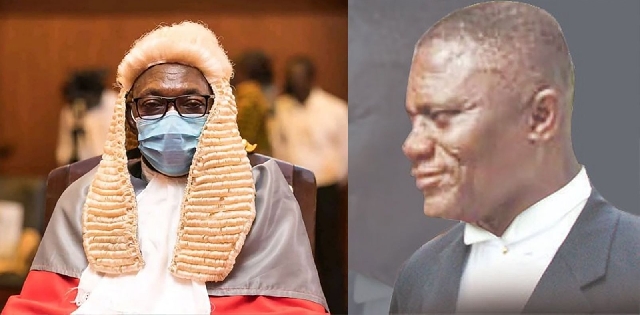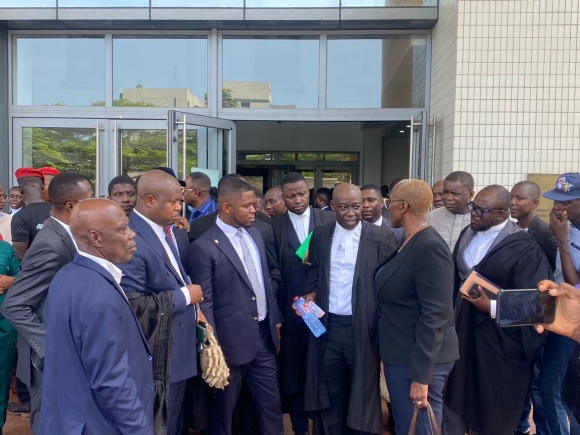Justice Aboagye Tandoh, the third and current judge hearing the six-year-old GHS217-million ‘causing financial loss’ case against former Ghana Cocoa Board Chief Executive Stephen Opuni and businessman Seidu Agongo, has been nominated by President Nana Akufo-Addo among 19 others for the bench of the Court of Appeal.
The other nominees are His Lordship Justin Dorgu J, Her Ladyship Gifty Dekyem J, His Lordship Kofi Akowah J, His Lordship Gyamfi-Danquah J, and Her Ladyship Olivia Obeng Owusu J.
The other nominees are Her Ladyship Cecilia Davis J, His Lordship George Krofa Addae J, His Lordship Alexander Osei Tutu J, His Lordship Francis Obiri J, His Lordship Kwasi Boakye J, and Her Ladyship Lydia Osei-Marfo J.
The rest, who are non-judges, include Ms. Mariam Agyeman Gyasi Jawhary, Ms. Yaa Onyameye Gyakobo, Mr. Charles Zwennes, Mr. Yaw Oppong, Mr. Nathan Parker Yarney, Mr. David Boafo, Mr. Francis Koffie and Dr. Poku Adusei.
Justice Aboagye Tandoh took over the COCOBOD case from the previous judge, Justice Kwasi A. Gyimah, who was later transferred to the Ashanti Region by Chief Justice Gertrude Torkonoo when she took office.
Justice Gyimah had ruled, after taking over the case from now-retired Justice Honyenuga, that the matter be held de novo (from scratch) due to several complaints of bias against Justice Honyenuga by the accused persons in the course of the trial.
The Attorney General challenged that ruling successfully at the Supreme Court, which ruled that the case should continue from where Justice Honyenuga left it.
Just like they complained about the alleged bias of Justuce Honyenuga, the accused persons have also had occasion to label Justice Tandoh as biased and even filed applications for his recusal to no avail.
In one such case, Dr Opuni filed a motion to get Justice Tandoh off the trial, citing “real likelihood of bias” on the part of the judge.
The former chief executive officer of Ghana Cocoa Board filed the application on 27 October 2023.
Dr Opuni (the first accused person) who is being trialled together with Mr Agongo and the former’s company, Agricult Ghana Limited, on 27 counts, including willfully causing financial loss to the state and contravention of the Public Procurement Act in the purchase of Lithovit liquid fertiliser between 2014 and 2016, averred that the current judge exhibited conduct that shows he cannot be a fair arbiter in the matter, and, thus, wanted him to recuse himself from the case.
Among other things, Dr Opuni put forth in his affidavit in support of the recusal motion: “I state that the conduct of the trial judge, particulars of which are contained hereinabove, leads to only one conclusion; which is that: I will not be given a fair trial, as he has been very unfair to me by way of not only seeking to intimidate and embarrass my counsel but further that he intends to rush through the trial and thereafter convict me”.
The recusal hearing was billed for 13 November 2023, but Justice Tandoh used his “discretion” to abridge the returning date to Wednesday, 1 November 2023, much to the chagrin of the lead counsel for Mr Agongo and Agricult, Mr Benson Nutsukpui, a former President of the Ghana Bar Association, who had, in previous sittings, accused the judge of introducing “alien” and “totally unknown” practices into the matter.
Justice Tandoh ordered the court registry to serve the second and third accused persons with the recusal motion by the end of the day when Mr Nutsukpui told the court on Monday, 30 October 2023, that his side had not been served.
However, Mr Nutsukpui tried to draw the attention of Justice Tandoh to consider the practice where the parties in a case were given three days to respond to such applications, but the judge stood his ground.
“Even the three clear days have been denied us?” Mr Nutsukpui quizzed, to which the judge declared: “I have exercised my discretion”.
Appointments to the Court of Appeal are done by the president in consultation with the Judicial Appointments Advisory Board (JAAB), which is headed by the Chief Justice of Ghana.
Section 3 of Article 144 of the 1992 Constitution of Ghana states: “Justices of the Court of Appeal and of the High Court and Chairmen of Regional Tribunals shall be appointed by the President acting on the advice of the Judicial Council.”
Akufo-Addo promotes Honyenuga
Just as in the case of Justice Tandoh, in March 2020, President Nana Akufo-Addo appointed then-Court of Appeal judge Clemence J. Honyenuga to the bench of the Supreme Court, along with three others: Yoni Kulendi, private legal practitioner; Justice Issifu Omoro Tanko Amadu of the Court of Appeal; and Professor Henrietta Mensa-Bonsu, a law lecturer at the Faculty of Law of the University of Ghana, Legon and President of the Ghana Academy of Arts and Sciences. They were later vetted and approved by parliament, and subsequently sworn into office.
At the time, Justice Honyenuga was the trial judge in the controversial case.
Justice Honyenuga, who was the first judge to sit on the matter, had heard it for, at least, two years going into his third year.
Prior to his promotion, Justice Honyenuga, who is also the Paramount Chief of the Nyagbo Traditional Area, had been condemned by the main opposition National Democratic Congress (NDC) in the Volta Region for singing the praises of the President and advocating a second term for him contrary to the Judicial Code of Conduct. Justice Honyenuga, in his welcome address to President Akufo-Addo at a durbar of chiefs and people of the Afajato South District earlier that year, said: “We wish to congratulate you for the excellent manner you are governing this dear country of ours, Ghana, and the significant gains made in the economy in your first term”, adding: “It is true that you have won high admiration, not only in Africa but also in advanced democracies.
“Your flagship programmes, like the Free Senior High School, Planting for Food and Jobs – which has increased food production and has even led to exports; – One District-One Factory, among others, has (sic) increased food production and has (sic) improved upon the standard of living of many Ghanaians”, he said.
“Indeed”, he added: “For special mention is the Free SHS, which has broken boundaries and has greatly bridged the gap between the rich and the poor”, observing: “This programme has also broken the record, which was held by the first President of the Republic of Ghana, Dr Kwame Nkrumah, who gave free education to our brothers and sisters in the northern part of Ghana”.
The judge cum chief continued: “Your Free SHS programme is unprecedented in the history of Ghana, in a first term, as it covers the whole country”. “We wish to congratulate you for the excellent manner you are governing this dear country of ours; it is our hope that with your vision and the gains made in your first term, Ghanaians may consider giving you another four years,” he stated.
While being vetted for the appointment, Justice Clemence Honyenuga said if the speech he read on behalf of the chiefs and people of Afadjato a few months prior, which, in his view, was misconstrued as his personal endorsement of President Nana Akufo-Addo made some people unhappy, then he was sorry for those remarks.
“[For] my part, if out of political dissatisfaction, some people are unhappy with whatever I am supposed to have said, then I am sorry,” Justice Honyenuga told Parliament’s Appointments Committee on Monday, 11 May 2020 while being vetted.
According to him, he did not endorse the presidency of Nana Akufo-Addo in his personal capacity. He explained that the media misrepresented him and did not state that the endorsement was not his, but a speech he was elected to read on behalf of the chiefs.
The judge also indicated that the assertion that the president visited his traditional area was untrue, as the president visited the Afadjato area where he was selected to speak on behalf of the traditional leaders
Source: Classfmonline





